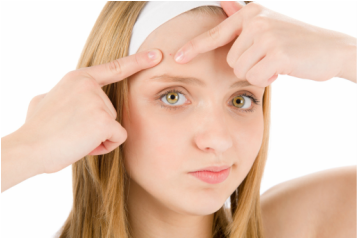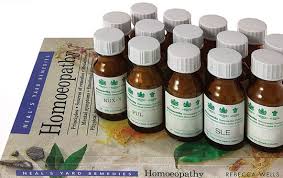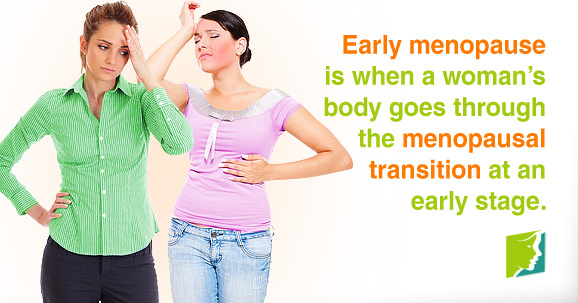
There are several menopausal symptoms out there that you might be interested in knowing about, such as insomnia, night sweats, hot flashes, irritability, headaches, joint pain, anxiety, mood swings, and acne. Although not all women will get acne during menopause, you might be one of the 10% of them that will - and you will absolutely hate it, especially if you haven't seen a single pimple since your teenage years.
Well, acne during puberty and acne during menopause are actually quite similar as they are both caused by fluctuating hormones. However, older women who are going through menopause might have more trouble struggling with the problem because menopause also comes with a variety of other symptoms.
What Causes Acne During Menopause?
During menopause, female hormones like estrogen, testosterone, DHEA and progesterone will rage, making the sebaceous glands more sensitive. This will, in turn, make them produce more sebum than necessary and make more skin cells die, resulting in more facial oil and more dead skin cells. Since the female body won't be able to keep up with this, it won't be able to get rid of them quickly enough, either. So, your face's hair follicles will fill up with these dead cells and oil, increasing the production of sebum and making acne flair up - just like in your teenage years.
Acne During Menopause vs. Acne As A Teenager
There are some differences between teenage acne and menopausal acne, though. During menopause, the face's hair follicles and the sebaceous glands have a certain enzyme that can create androgen testosterone out of estrogen and cause more production of oil than ever before. Unfortunately, this also means that you will probably suffer from more acne breakouts than ever before, as well.
How Can You Treat Acne During Menopause?
Acne during menopause can definitely be a frustrating problem. Fortunately, however, you can look into various methods to get rid of it. First of all, take a good look at your diet. You have to make sure that you eat more foods filled with fiber and calcium. Also, make sure you eliminate some of the carbohydrates in your diet since they can turn your body's insulin into androgens and, as mentioned earlier, androgen is responsible for increasing the skin's production of sebum. Another change you should make regarding your diet is to drink at least eight glasses of water every day.
Aside from making changes to your diet, you should also consider taking some supplements. There happen to be a lot of herbs, minerals and vitamins available in the market today that can help with the elimination of oil production inside your body. Most women swear by natural supplements during this stage, though, since they are considered to be both safe and effective. Plus, they can get rid of a lot of unwanted side effects at the same time.
Supplements and regular diet changes aren't the only things to take into consideration, either. You also have to take good care of your skin and clean it twice a day. Regular exfoliation is also a must, so that you can get rid of dead skin cells. If you have a lot of open pores - which are responsible for collecting dirt that creates acne - you can just close them up with the right toner for you, as well.
Well, acne during puberty and acne during menopause are actually quite similar as they are both caused by fluctuating hormones. However, older women who are going through menopause might have more trouble struggling with the problem because menopause also comes with a variety of other symptoms.
What Causes Acne During Menopause?
During menopause, female hormones like estrogen, testosterone, DHEA and progesterone will rage, making the sebaceous glands more sensitive. This will, in turn, make them produce more sebum than necessary and make more skin cells die, resulting in more facial oil and more dead skin cells. Since the female body won't be able to keep up with this, it won't be able to get rid of them quickly enough, either. So, your face's hair follicles will fill up with these dead cells and oil, increasing the production of sebum and making acne flair up - just like in your teenage years.
Acne During Menopause vs. Acne As A Teenager
There are some differences between teenage acne and menopausal acne, though. During menopause, the face's hair follicles and the sebaceous glands have a certain enzyme that can create androgen testosterone out of estrogen and cause more production of oil than ever before. Unfortunately, this also means that you will probably suffer from more acne breakouts than ever before, as well.
How Can You Treat Acne During Menopause?
Acne during menopause can definitely be a frustrating problem. Fortunately, however, you can look into various methods to get rid of it. First of all, take a good look at your diet. You have to make sure that you eat more foods filled with fiber and calcium. Also, make sure you eliminate some of the carbohydrates in your diet since they can turn your body's insulin into androgens and, as mentioned earlier, androgen is responsible for increasing the skin's production of sebum. Another change you should make regarding your diet is to drink at least eight glasses of water every day.
Aside from making changes to your diet, you should also consider taking some supplements. There happen to be a lot of herbs, minerals and vitamins available in the market today that can help with the elimination of oil production inside your body. Most women swear by natural supplements during this stage, though, since they are considered to be both safe and effective. Plus, they can get rid of a lot of unwanted side effects at the same time.
Supplements and regular diet changes aren't the only things to take into consideration, either. You also have to take good care of your skin and clean it twice a day. Regular exfoliation is also a must, so that you can get rid of dead skin cells. If you have a lot of open pores - which are responsible for collecting dirt that creates acne - you can just close them up with the right toner for you, as well.


 RSS Feed
RSS Feed
